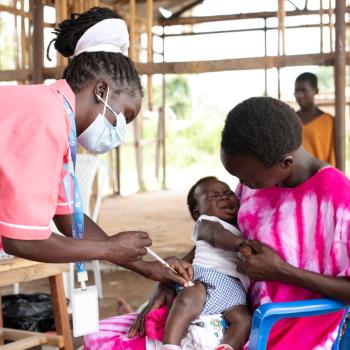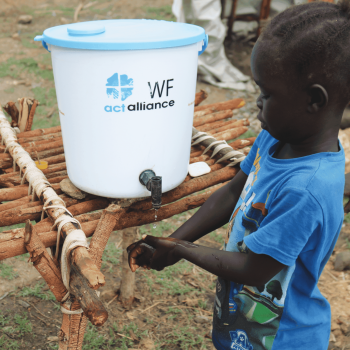Inspired by God’s love for humanity, we respond to human suffering and challenge its causes. We want to contribute to community development through rights-based empowerment for sustainable development. We serve all people irrespective of ethnicity, gender, religion, race or political conviction.
The Lutheran World Federation (LWF) World Service Uganda Programme has a proven track record of 45 years of service in the realm of humanitarianism. Through our programs, we tirelessly serve the most vulnerable populations, extending timely, compassionate, and expert humanitarian aid to those in the most inaccessible regions. We strive to alleviate poverty, resettle those displaced due to insurgency, and elevate the standards of living of both refugees and Ugandans.
Global Mandate
The Lutheran World Federation: 145 Member Churches in 98 Countries Worldwide
Mandated by the communion of LWF member churches to carry out effective and empowering diakonia addressing human suffering, injustice and emergencies, the World Service works with and for vulnerable and crisis-affected populations to achieve justice, peace and sustainable livelihoods. World Service's uniqueness is to be locally rooted and globally connected. LWF Uganda is a country program of the LWF Department for World Service, and is aligned with its mission, vision and values.
- Our Mission
Inspired by God’s love for all of humanity, LWF Uganda is dedicated to challenging and addressing the causes and effects of human suffering and poverty, linking local responses to national and international advocacy.
- Our Vision
Communities in Uganda living in just societies in peace and dignity, united in diversity, are able to meet their basic needs, achieve their full potential, and claim their universal rights in order to improve their quality of life individually and collectively.
- Our Core Values and Principles
Dignity, Human Rights and Justice
We believe that every person has the right to a dignified life, free of abuse, discrimination and oppression. We trust that upholding human rights is fundamental in alleviating poverty among the people we serve; brings about justice and peace and ensures sustainable development. God given dignity to every human has laid a foundation for international human rights’ principles and convention] which guides our work, actions and operations.
We are dedicated to working with those who are suffering, those who are unable to speak up for themselves and those who live in isolated areas. We go an extra mile to reach out to those who may have been forgotten or those considered out of reach.
We believe in the value and power of diversity and inclusion within the communities where we work as well as within our own workforce.
We believe that sustainable development is based on meaningful participation of all people in our programs regardless of gender, age and ability. Participation means people are part of decision-making and can hold local duty-bearers to account.
Transparency and Accountability
We are strongly committed to transparency and accountability to the people and communities we serve, as well as our partners and donors. We set high quality standards and regularly monitor our efforts for continuous improvement. We are aligned with international standards and have developed our own complaints-handling mechanism.
We provide support to people irrespective of race, religion, ethnicity, age, gender, sexual orientation or political conviction. We subscribe to the humanitarian principles of humanity, neutrality, impartiality and independence.
We believe that women and men were both created in the image of God, are co-responsible stewards of creation. Gender justice is expressed through equality and balanced power relations between women, girls, men and boys. We are committed to eliminating institutional, cultural and interpersonal systems of privilege and oppression that sustain discrimination against women.
Women and girls form the majority of those living in poverty in the communities where LWF works. They have limited access to productive resources, as most African societies prescribe less power and less influence in decision making when compared to their male counterparts. They are exposed to various forms of discrimination, violence and exploitation. We believe that transforming gender and power relations and the structures, norms and values that underpin them, is critical to ending poverty and challenging inequality. In this strategic period LWF reaffirms its commitment to ensure that gender considerations and related actions are integrated in all our programs work.
The livelihood of the individuals and communities that LWF works with is highly dependent on the exploitation of her natural resources including climate. We are committed to ensuring that our programs minimize the immediate and long-term risks of climate change to those communities we serve. LWF will continue to align its work to the national plans process and plans like the Uganda National Climate Change Policy and the Intended National Contributions which prioritize adaptation. LWF will continue to work to reduce vulnerability and addressing adaptation in agriculture and livestock, forestry, water, energy, health and disaster risk management climate smart agriculture, sustainable land management and climate smart agriculture to increase resilience at grass root level.
Explore LWF Uganda
Our Approach
Community Based Approach
Over the years, LWF Uganda has moved away from a service-delivery approach to increased focus on empowerment and community-led approaches. The community-based approach engages communities in the attainment of their own development goals. Through basic Participatory Rural Appraisal, LWF works in partnership with communities to conduct needs assessments and surveys at the local level, the results of which determine their development needs. Community participation is ensured throughout the process to enhance transparency, sustainability and ownership, by utilizing of the input and data collection of community volunteers even at the lowest level.
Integrated Approach
One of LWF Uganda’s program focus is the right to food and the right to an adequate standard of living. However, the program is keenly aware that the causes of food insecurity in rural communities are complex and require holistic approaches in order to find solutions. Two insights guide this approach. First, in order to prevent fragmentation of interventions which reduces impact severely, offering comprehensive development packages to small communities through intensive interaction is preferred to setting up area-wide programs affecting many loose individuals in communities. Group dynamic strengthens the impact on individual communities, while strong communal bonds are supported and encouraged. Strong groups can consequently withstand potential risks better than individual households, and the inclusion of vulnerable people in larger communities stimulate their advancement. Our work therefore directly addresses and facilitates the removal of these barriers individually in the targeted communities, tailoring development initiatives for each area to ensure that all areas can in the future partake in holistic and sustainable development.
Linking Relief, Rehabilitation to Development (LRRD)
Along addressing emergencies, LWF rolls-out the LRRD concept throughout its programmes to broaden benefits to programming that includes structuring humanitarian relief and development assistance in such a way as to reduce dependence on aid and support self-reliance for communities at the earliest opportunity. LRRD also includes components of risks reduction, vulnerability reduction, promoting of sustainable livelihoods and mainstreaming the human rights approach.
Rights Based Approach
All human beings have the right to a life in dignity. People who are oppressed, vulnerable and poor are not objects of charity but rights holders. The emphasis on human rights in the context of development helps us to focus on the structural inequalities that cause and perpetuate impoverishment and exclusion, so that the root causes of poverty and exclusion receive proper attention. within the Framework of International Covenant on Economic, Social and Cultural Rights (ICESCR), LWF Uganda raises awarenesses and advocates for people's rights at all levels. We assist communities to acquire knowledge and skills which leads to changed attitudes and transforming people into informed decision makers and active citizens. Active citizens are able to challenge policies or actions and existing structures on the basis of principles such as equality, inclussiveness, diversity and social justice.





